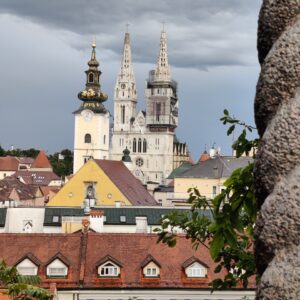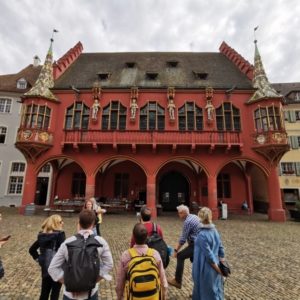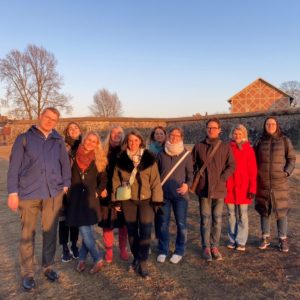Material
Getting Acquainted with School
Information
Full title of the example
“Getting Acquainted with School – example of coherence in the Subject Teacher Education programme at the University of Helsinki”
Topic
Coherence between PK, PCK and school practice
Type of the example
Power Point presentation (PDF document)
Target group
Subject teacher students
Institutions involved
Faculty of Educational Sciences, Department of Education, Subject Teacher Education Programme: university teachers, student teachers. University of Helsinki Teacher Training Schools or field schools: schoolteachers, principals and non- teaching professionals at schools, pupils/students
Objectives
- Students study their own teaching subject/other subjects from a didactical point of view
- Students familiarize themselves with subject teacher’s task as an educator
- Students gain preparedness to study and analyze the teaching-studying- learning process
- Students start to develop their own pedagogical thinking
Short description in English
Getting Acquainted with School (GAWS, 1 cr) is connected to Basic Practice but completed in the previous period. GAWS is also connected to the first subject didactics course and taken during it. GAWS includes a 3-day instructed school visit (usually in the University of Helsinki’s Teacher Training Schools) during which Student teachers observe and analyze lessons in different subjects. Students are divided into mixed groups of about 5 students from different subjects. GAWS involves both students’ individual work and group work. Students are given study material and they are expected to share their experiences in groups while carrying out the associated tasks. Each day of the visit has its own theme and related tasks. During each day, there are normally three or four lessons to be observed. The assessment of the course unit is based on the participation of all three days of the school visits and turning in a final essay.
Longer description in the target language
Pakollinen opintojakso Kouluun tutustuminen (1 op) on perusharjoitteluun sisältyvä 3- päiväinen kouluvierailu, joka on tarkoitettu perus- ja lukio-opetukseen suuntautuvan opettajan pedagogisia opintoja suorittavalle opiskelijalle. Opintojakso suoritetaan opettajan pedagogisten opintojen 1. periodissa ennen perusharjoittelun alkamista Ainedidaktiikka I: Opetussuunnitelma ja opetus – opintojakson yhteydessä. Hyväksytty suoritus on edellytys perusharjoitteluun osallistumiselle. Kouluun tutustuminen suoritetaan osallistumalla harjoittelukouluissa (tai kenttäkouluissa) toteutettavaan jaksoon, johon sisältyy oppituntien seuraamista, ryhmätyöskentelyä, erilaisia tehtäviä ja essee. Opiskelijat jaetaan n. 5 hengen ryhmiin, joissa on eri oppiaineiden opettajaopiskelijoita. Opiskelijat seuraavat päivittäin 3-4 oppituntia. Opiskelijat saavat Kouluun tutustumista varten opiskelumateriaalin, joka sisältää opintojakson aikana suoritettavia tehtäviä. Jokaiselle vierailupäivälle on oma teema ja siihen liittyvät tehtävät, joita opiskelijat suorittavat itsenäisesti ja ryhmissä ennen vierailua ja sen aikana. Opintojakson tavoitteena on tutustuttaa opiskelijat koulun käytäntöihin, aineenopettajan työhön ja oman opetettavan aineen didaktisiin käytäntöihin. Jakso valmistaa opiskelijoita myös arvioimaan opetus-opiskelu-oppimisprosessia ja kehittämään omaa pedagogista ajatteluaan, jota opiskelijat harjoittelevat perusharjoittelun kokonaisuuden yhteydessä. Perusharjoittelun suoritettuaan opiskelija osaa tarkastella opetusta, koulua toimintaympäristönä sekä ymmärtää opetuksen ja kasvatuksen arvoperustaa. Kouluun tutustuminen arvioidaan osallistumisen ja raportin perusteella. Raportti arvioidaan asteikolla hyväksytty–hylätty.
Download Information and Example
Events: ConnEcTEd
Blog: ConnEcTEd
Es gibt derzeit noch keine Beiträge in dieser Kategorie.

Reisebericht: ConnEcTEd Project Meeting in Zagreb
Ein zentrales Anliegen der School of Education FACE ist die Entwicklung kohärenter – also strukturell und inhaltlich sinnhaft zusammenhängender – Curricula oder Module im Rahmen des Lehramtsstudiums. Was liegt da in Zeiten der Globalisierung näher, als sich anzusehen, wie dieses Prinzip in anderen Staaten und Bildungssystemen umgesetzt wird? Im Rahmen des Projekts ConnEcTEd geschieht genau das. Im September dieses Jahres reiste eine Freiburger Delegation nach Zagreb, um sich dort gemeinsam mit Projektpartner*innen aus Oslo, Nizza, Helsinki und Zagreb in Präsenz zu diesem wichtigen Thema auszutauschen.

Ins Bächle „dappen“, oder nicht? Treffen des ConnEcTEd-Teams in Freiburg
After the first in-person-meeting in March in Oslo, the ConnEcTED-Team met for the second time in Freiburg im Breisgau at the end of May. In the „Green City“ on the western edge of the Black Forest, right on the border to Switzerland and France, the project members reported on their work, discussed new tasks and further steps in the project, as well as forms of collaboration in different IOs.

Reisebericht: Das ConnEcTEd-Team in Oslo
Ein zentrales Anliegen der School of Education FACE ist die Entwicklung kohärenter – also strukturell und inhaltlich sinnhaft zusammenhängender – Curricula oder Module im Rahmen des Lehramtsstudiums. Was liegt da in Zeiten der Globalisierung näher, als sich anzusehen, wie dieses Prinzip in anderen Staaten und Bildungssystemen umgesetzt wird? Im Rahmen des Projekts ConnEcTEd geschieht genau das. Ende März dieses Jahres reiste eine Freiburger Delegation nach Oslo, um sich dort in Präsenz zu diesem wichtigen Thema auszutauschen.
Funding
This project receives funding from the Erasmus+ programme of the European Union (Strategic Partnerships, KA 203).
The contents of this website and the view expressed in the news and publications are the sole responsibility of the authors and under no circumstances can be regarded as reflecting the position of the European Union.




